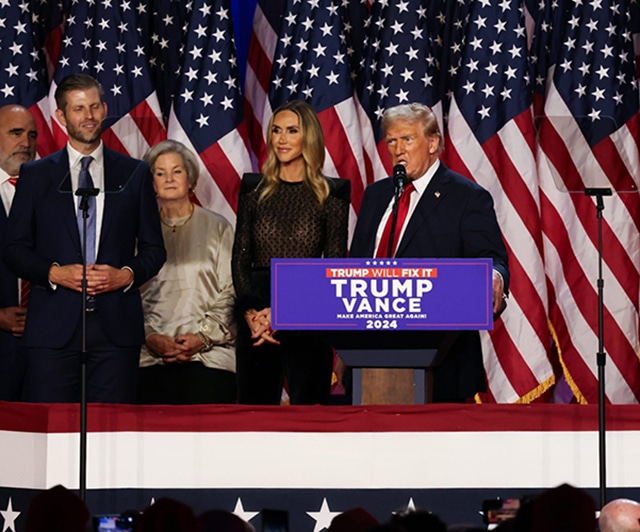Donald Trump is president, again. There is a lot that comes with that, but we’ll focus on his proposed economic policies, and what it all might mean for business.
Tariffs
Let’s start with a hotly debated topic: tariffs. Tariffs are taxes imposed by one country on goods imported from another country; they’re baked into prices of products, so they aren’t always talked about among typical Americans (among economists, well, that’s a different story).
What you need to know is the importing company pays the tariff, not the exporting one. Companies often pass on as much of that cost as they can to consumers. Trump has proposed a 60% tariff on all Chinese imports and a universal 10% tariff on imports from all countries, a practice unseen since World War II.
Six years ago, Trump called himself “a Tariff Man.” This year, on the campaign trail, he stressed tariffs can be used as a penalty or threat of sorts to keep other countries in line and elevate America. At a rally in June, he said: “We are going to be so tough, and if a country is not going to behave, we’re going to tariff the hell out of that country.”
But tariffs might not actually be great for everyday people. His tariffs could cost a middle-income household $1,700 a year, according to the Peterson Institute for International Economics. If that 10% universal tariff were to actually be a 20% universal tariff, which he has floated, it would cost that same middle-income household $2,600 a year.
Higher tariffs do not go hand in hand in with what economists call free trade; and again, six years ago, Trump said, “trade wars are good, and easy to win.”
Two economists previously told me tariffs were one part of Trump’s policy proposals they considered inflationary, another was his potential tax policies. Wall Street is anticipating lower taxes, for one.
Taxes
Trump has called for lowering the corporate tax rate to 15% for certain companies, he’s teased an end to taxing tips, and he’s even flirted with eliminating federal income taxes. Not to mention, he wants to extend parts of a 2017 law passed in his first term, particularly income and estate tax cuts, that are set to expire at the end of next year.
Regulation
And in terms of regulation, his policies aren’t very surprising: Republicans and deregulation often gang together like salt and pepper. Businesses typically love that; crypto definitely does.
Housing
But let’s take a moment to consider the world of housing, something Federal Reserve Chair Jerome Powell has said the central bank can’t fix, even if it has managed to tamp inflation down. Housing could be at the root of this widespread dissatisfaction with the economy, and apart from mass deportation, Trump seems to waffle on the issue.
Four years ago, Trump and Ben Carson, his secretary of Housing and Urban Development, wrote a commentary in the Wall Street Journal titled: “We’ll Protect America’s Suburbs.” They condemned abolishing single-family zoning and building apartments in certain neighborhoods.
This year, on the campaign trail, when he was still running against Joe Biden, Trump said he’d stop Biden’s “sinister plan to abolish the suburbs.” But in an interview with Bloomberg, he called zoning “a killer.”
You can’t punish blue cities for strict regulations while protecting suburbs and allowing their exclusionary practices, an economist previously told me.
Congress holds the power of the purse though, we can’t forget that, even if there are things Trump can implement via executive order.
There is one thing to consider with this Trump win, it’s that a lot of Americans trust him with the economy — that is despite the fact that economists expect prices to rise under him. Even so, markets are surging on his win.
This article was first published in Fortune and was provided by Reuters.
Advisor comments
Normally “Rethinking65” articles reflect value and insight. Here is one in today’s email that fell below the standard.
The article, “Tariffs, Trade, Taxes: What We Know About Trump’s Policies” that Alena Botros apparently wrote and Rethinking65 just emailed is clearly written by someone who does not understand how newly elected President Trump has used and will continue to use Tariffs. His approach is NOT inflationary. And furthermore, his approach will bring jobs into the US.
One of the biggest mistakes made by Botros in her article is her statement that there is actually free trade globally. Other countries have policies and practices that are anything but free and fair for US products and services. Tariffs are a tool Trump has already demonstrated how to use to overcome many of the unfair global practices and policies that will benefit the US consumer.
Her words on “Regulation” demonstrate her poor understanding of the purpose and value of regulations. Unfortunately, many federal regulations have been put into play in response to major business failures, scandals, and unfair practices directly tied to clear character deficits of business and political leaders. Enforce the existing criminal laws rather than write new business regulations. Regulations cannot make up for bad character. And bad regulations will grind creativity, innovation, and reasonable profitability out of the economy. Trump understands this as he had in place as a policy while he was President for every one of his advisors who wanted to put into place a new regulation, to withdraw two current regulations. It was called “one-in, two-out”.
This author does not understand the topic she addressed.
Steve Manuel
The Game Changing Advisor™







